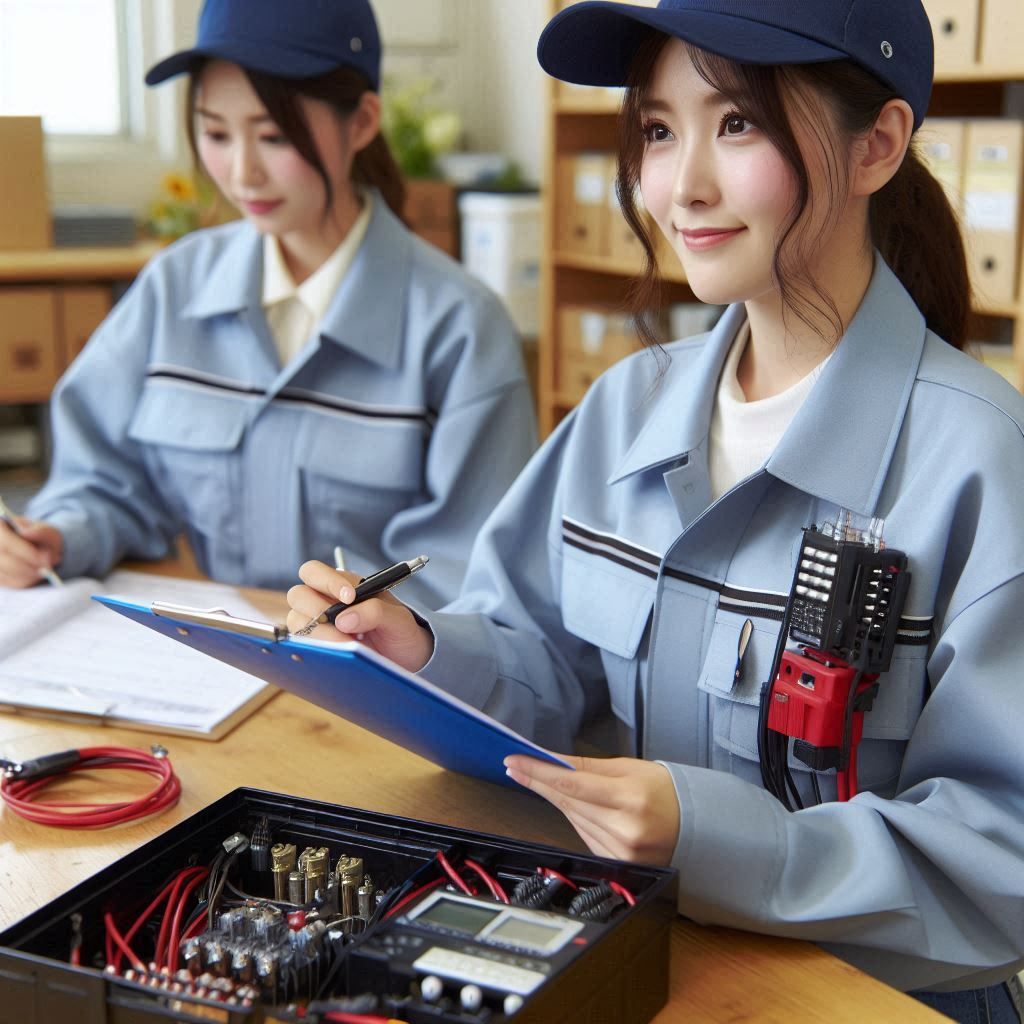Introduction
Internships are essential for Field Service Technicians, serving as a gateway to practical, hands-on experience that significantly enhances career readiness.
These programs are vital for translating classroom theories into real-world skills.
They offer a unique chance to work directly with equipment, understand complex systems, and solve actual technical problems under the guidance of seasoned professionals.
Internships help build a solid foundation, preparing technicians for the demands and nuances of the field.
Gaining hands-on experience through internships provides several key benefits.
It allows interns to apply their theoretical knowledge in practical scenarios, which deepens their understanding of the equipment and technologies they will work with.
Interns develop critical problem-solving skills, learn to use diagnostic tools, and become proficient in troubleshooting and repair.
Additionally, internships offer exposure to industry best practices, safety protocols, and customer service skills, which are crucial for a successful career in field service.
Furthermore, internships enable interns to build a professional network, creating valuable connections with mentors, peers, and industry leaders.
These relationships can lead to future job opportunities, references, and insights into industry trends.
Overview of Field Service Technician Internship Roles
Responsibilities and Tasks Typically Assigned to Interns
Field Service Technician interns are usually assigned tasks that provide foundational experience in the field.
Their primary responsibilities include assisting in the diagnosis and repair of equipment.
Interns often work under the supervision of experienced technicians, helping to identify and fix malfunctions in various systems.
They may perform routine maintenance tasks such as cleaning, calibrating, and replacing parts to ensure equipment operates efficiently.
Interns also assist in the installation of new equipment, ensuring it is set up correctly and meets operational standards.
They are often responsible for documenting service activities and maintaining accurate records, which is essential for tracking maintenance history and troubleshooting future issues.
Additionally, interns might participate in troubleshooting sessions, where they work alongside seasoned professionals to address and resolve real-world problems.
Skills and Knowledge Gained During the Internship
Interns gain a wide array of technical skills essential for their career.
They learn how to use diagnostic tools and equipment to identify issues accurately.
Hands-on experience with different types of machinery helps them understand how to troubleshoot various problems.
Interns also acquire knowledge about industry standards, safety protocols, and best practices, which are crucial for working in the field.
Practical experience helps build problem-solving abilities, as interns learn to approach and resolve technical challenges.
They develop a solid understanding of the equipment and technologies specific to their industry, whether it‘s manufacturing, healthcare, telecommunications, or utilities.
Soft skills such as communication, teamwork, and customer service are also honed, as interns interact with clients and collaborate with colleagues.
Importance of Practical Experience
Practical experience is invaluable in preparing for a career as a Field Service Technician.
It bridges the gap between theoretical knowledge gained in educational settings and the real-world application of that knowledge.
Hands-on experience allows interns to apply what they‘ve learned, making them more effective in diagnosing and repairing equipment.
It also helps build confidence in their technical skills and problem-solving abilities.
Exposure to industry-specific tools and technologies prepares interns for the demands of their future roles.
Practical work experience also provides insights into the daily responsibilities of a Field Service Technician, helping interns understand what to expect in their careers.
Moreover, the experience helps build a professional network, which can be beneficial for job searching and career advancement.
Types of Companies Offering Internship Opportunities
Different Types of Companies Offering Internships
Field Service Technician internships are available across a range of company types.
Equipment manufacturers often provide internships that focus on understanding their products and learning about their maintenance and repair.
These internships offer insights into the design and functionality of the equipment, which is valuable for troubleshooting and servicing.
Service providers, such as HVAC companies or IT service firms, offer internships where interns learn about installing, maintaining, and repairing systems.
These internships provide experience with client interactions and service management.
Utilities companies, including those in power and water sectors, offer internships that involve managing and maintaining critical infrastructure.
Medical equipment companies also provide specialized internships for those interested in healthcare technologies.
These internships focus on maintaining and repairing medical devices, which requires understanding specific safety and compliance regulations.
Each type of company offers unique experiences and exposure to different aspects of field service work.
Industries Where Internship Opportunities Are Abundant
Several industries have abundant internship opportunities for Field Service Technicians.
The manufacturing sector is one such industry, with a constant need for technicians to maintain production machinery.
The telecommunications industry also offers numerous internships related to network installation and maintenance, providing experience with communication systems and technology.
The healthcare industry provides opportunities for interns to work with medical equipment, ensuring that devices operate safely and effectively.
The energy sector, including both traditional and renewable energy companies, presents internships focused on maintaining infrastructure such as power grids and solar panels.
These industries offer diverse experiences and help interns gain exposure to various types of equipment and technologies.
Company Cultures and Work Environments
Internship experiences vary based on the company culture and work environment.
Equipment manufacturers often have structured environments with a focus on technical expertise and product knowledge.
Service providers usually have dynamic settings where customer interactions and problem-solving are key.
Healthcare firms emphasize precision and adherence to safety standards, while utilities companies often operate in formal environments focused on reliability and infrastructure management.
Understanding the company culture helps interns adapt and make the most of their internship experience.
Each work environment provides unique learning opportunities and helps interns develop skills relevant to their industry.
How to Find and Apply for Field Service Technician Internships
Where to Search for Internship Openings
Begin your search for internships on popular online job boards. Websites like Indeed, LinkedIn, and Glassdoor regularly list internship opportunities.
Use specific keywords such as “field service technician internship” to narrow down your search.
Additionally, visit the career pages of companies you‘re interested in.
Many organizations post internship openings directly on their websites.
Also, check industry-specific job boards or forums related to field service and technology.
These specialized platforms often feature niche opportunities that general job boards might miss.
Crafting a Strong Resume and Cover Letter
A well-crafted resume and cover letter are crucial for securing an internship.
Start with a resume that highlights relevant coursework, technical skills, and any hands-on experience you‘ve had.
Include certifications or training that relate to field service, even if they‘re not professional.
Use bullet points to make your accomplishments and responsibilities easy to read.
Tailor your resume to each specific internship by emphasizing skills and experiences that match the job description.
In your cover letter, express your enthusiasm for the field service industry.
Explain why you are interested in the particular company and how their internship aligns with your career goals.
Highlight specific skills or experiences that make you a strong candidate.
Mention any relevant projects or coursework that demonstrate your ability to contribute effectively.
Keep the letter concise and professional, and be sure to proofread for errors.
Ways to Stand Out During the Application Process
To make your application stand out, showcase any relevant skills and experiences prominently.
If you have experience with specific tools or technologies used in field service, highlight them.
Mention any internships, part-time jobs, or volunteer work related to the industry.
Demonstrate problem-solving abilities and technical proficiency through concrete examples.
Consider creating a portfolio that includes any relevant projects or technical work.
A well-organized portfolio can set you apart from other candidates by providing tangible evidence of your skills.
Additionally, prepare for interviews by researching common questions and practicing your responses.
Show genuine interest in the company and the role during interviews.
Networking can also enhance your application.
Reach out to professionals in the field through LinkedIn or industry events.
Building connections can sometimes lead to insider information about internship openings or recommendations.
In review, finding a field service technician internship involves searching on job boards, company websites, and industry-specific platforms.
Craft a strong resume and cover letter tailored to each position, showcasing relevant skills and experiences.
To stand out, prepare thoroughly for interviews, and consider networking to gain an edge.
These strategies will help you secure a valuable internship and set the foundation for a successful career in field service.
Read: How to Stay Updated in Environmental Engineering Field
Interview Preparation and Expectations
Common Interview Questions and Preparation
Interviewers often ask about your technical background and problem-solving abilities.
Expect questions like ‘Can you describe a time you resolved a technical issue?‘ or ‘How do you prioritize tasks in a busy environment?‘ To prepare, review your technical skills and experiences.
Practice explaining how you solved specific problems and the methods you used.
Reflect on past projects or technical challenges and be ready to discuss them in detail.
Transform Your Career Today
Unlock a personalized career strategy that drives real results. Get tailored advice and a roadmap designed just for you.
Start NowAdditionally, interviewers might ask about your understanding of industry tools and technologies.
You might encounter questions such as ‘What tools are you familiar with?‘ or ‘How do you stay current with industry trends?‘ Research common tools and technologies used in the field.
Be ready to discuss any relevant experience you have with these tools.
Demonstrating Technical Proficiency and Problem-Solving Skills
During the interview, showcasing your technical proficiency is crucial.
Discuss specific examples of your hands-on experience with equipment or systems.
For instance, you might explain how you used diagnostic tools to identify and fix an issue.
Highlight your problem-solving skills by detailing a complex issue you resolved.
Describe the problem, your approach to solving it, and the outcome.
Use the STAR method (Situation, Task, Action, Result) to structure your answers clearly and concisely.
If asked to solve a technical problem during the interview, think aloud as you work through it.
This approach demonstrates your problem-solving process and technical knowledge.
It also shows your ability to handle pressure and think critically.
What Employers Look for in Interns
Employers seek interns who are eager to learn and show a strong work ethic.
They look for candidates who demonstrate technical skills and a willingness to adapt.
Highlight your enthusiasm for the field and any relevant coursework or projects.
Employers value candidates who can communicate effectively and work well in a team.
Show your ability to collaborate by discussing past experiences where teamwork was key to success.
Mention any leadership roles or group projects where you made a positive impact.
Reliability and a positive attitude are also important.
Employers want interns who are dependable and motivated to contribute.
Be sure to convey your enthusiasm for the role and the company.
Research the company‘s values and mention how they align with your career goals.
In general, preparing for a field service technician internship interview involves understanding common questions and showcasing your technical skills.
Demonstrate your problem-solving abilities through specific examples and be ready to discuss industry tools.
Employers look for enthusiasm, technical proficiency, and strong communication skills.
By highlighting these qualities, you can make a positive impression and increase your chances of securing the internship.
Read: Environmental Engineering Software and Tools

What to Expect During a Field Service Technician Internship
Interning as a Field Service Technician can be a rewarding and valuable experience for those looking to gain hands-on experience in a technical field.
During your internship, you can expect to learn a variety of skills and techniques that will help prepare you for a successful career in the industry.
A Typical Day in the Life of an Intern
As a Field Service Technician intern, your day may start with a morning meeting to discuss the tasks for the day.
You may then accompany experienced technicians on service calls to troubleshoot and repair equipment.
Throughout the day, you will have the opportunity to work on various projects and learn new skills under the guidance of your mentor.
Mentorship and Training Opportunities
One of the key benefits of interning as a Field Service Technician is the mentorship and training opportunities that you will receive.
Experienced technicians will provide you with guidance and support as you learn new skills and techniques.
This hands-on training will help you build confidence and prepare you for a successful career in the industry.
Potential Challenges and Strategies for Overcoming Them
While interning as a Field Service Technician can be a valuable experience, it may come with its own set of challenges.
One common challenge that interns may face is troubleshooting complex technical issues.
To overcome this challenge, it is important to ask questions, seek guidance from experienced technicians, and take the time to understand the problem thoroughly before attempting to solve it.
Additionally, time management and the ability to work under pressure are essential skills that can help you succeed in this role.
Overall, interning as a Field Service Technician can provide you with valuable experience and skills that will help you succeed in your future career.
By taking advantage of mentorship and training opportunities, and by being proactive in overcoming challenges, you can make the most of your internship experience and set yourself up for a successful career in the field.
Read: Tips for Writing Environmental Engineering Reports
Networking and Building Relationships
Importance of Networking During an Internship
Networking during an internship provides access to a broad professional network.
You can meet experienced technicians, managers, and industry experts.
These connections can offer valuable insights into the field service industry.
Networking helps you learn about potential job opportunities and industry trends.
Building a strong professional network can lead to future job referrals and career guidance.
Engaging with professionals helps you stay informed and connected to industry advancements.
Tips for Building Relationships with Supervisors and Peers
Building relationships with supervisors and peers enhances your internship experience.
Start by being proactive and showing genuine interest in your work.
Ask questions and seek feedback regularly.
Demonstrate your willingness to learn and take initiative on projects.
Attend team meetings and participate in discussions to become more involved.
Offer to assist with additional tasks or projects beyond your assigned duties.
This shows your commitment and eagerness to contribute.
Establishing good rapport with your supervisor is particularly important.
Schedule regular check-ins to discuss your progress and seek advice.
Show appreciation for their guidance and acknowledge their support.
Building a positive relationship with your supervisor can lead to valuable recommendations and mentorship.
Similarly, fostering strong relationships with peers can create a supportive work environment and lead to collaborative opportunities.
Long-Term Benefits of Maintaining Internship Connections
Maintaining connections made during your internship offers long-term benefits for your career.
These professional relationships can provide ongoing support and advice.
Staying in touch with former colleagues can lead to future job opportunities and career advancements.
Networking contacts often become valuable resources for job referrals and industry insights.
Former supervisors and peers can offer mentorship and professional guidance as you advance in your career.
Additionally, keeping these connections active can lead to invitations to industry events and conferences.
These events offer further networking opportunities and keep you updated on industry developments.
The relationships you build during your internship can also lead to collaborations and partnerships in future projects.
Long-term professional relationships can play a key role in your career growth and success.
In essence, internships offer vital opportunities for networking with industry professionals.
Building strong relationships with supervisors and peers maximizes learning and growth.
Maintaining these connections after your internship can provide long-term career benefits, including job referrals, mentorship, and continued industry insights.
Investing time in networking during your internship can significantly enhance your career prospects and professional development.
Read: Sustainable Wastewater Treatment Methods
Professional Development and Skill Building
Interns participating in field service technician internships can expect to develop a wide range of technical and soft skills that are essential for success in this role.
Here are some key skills that interns can expect to build during their internship
Transform Your Career Today
Unlock a personalized career strategy that drives real results. Get tailored advice and a roadmap designed just for you.
Start NowTechnical Skills
- Learning how to troubleshoot and diagnose technical issues
- Practicing repair and maintenance techniques for various equipment
- Developing proficiency in using diagnostic tools and software
- Gaining hands-on experience with different types of machinery and systems
- Understanding safety protocols and best practices in the field
Building these technical skills is crucial for interns to become proficient field service technicians.
By honing these abilities, interns can better serve customers and effectively address any technical challenges that may arise in the field.
Soft Skills
- Enhancing communication and interpersonal skills
- Improving problem-solving and critical thinking abilities
- Developing time management and organizational skills
- Learning to work effectively in a team environment
- Building resilience and adaptability in challenging situations
Soft skills are equally important for interns to succeed in their role.
Developing strong communication and problem-solving skills can help interns build relationships with clients, collaborate effectively with colleagues, and handle unexpected situations with professionalism.
Seeking Feedback and Continuous Improvement
Seeking feedback from supervisors and peers is an essential part of professional development during an internship.
Interns should actively solicit feedback on their performance, seek areas for improvement, and implement constructive criticism to enhance their skills.
By continuously seeking feedback and making an effort to improve, interns can progress in their field service technician role and demonstrate their commitment to personal growth and professional development.
Embracing feedback as a tool for improvement can lead to greater success in the internship and beyond.
Additional Training and Certifications
Interns looking to enhance their skills and qualifications further can consider pursuing additional training or certifications that are relevant to the field service technician role.
Some suggestions include
- Obtaining industry-specific certifications, such as HVAC or electrical certifications
- Participating in workshops or seminars on the latest technologies in the field
- Enrolling in online courses to expand knowledge in specific areas of interest
- Seeking mentorship opportunities with experienced field service technicians
- Joining professional associations to network and stay updated on industry trends
Investing in additional training and certifications can not only enhance an intern’s skills but also increase their marketability and competitiveness in the job market.
By continuously seeking opportunities for growth and learning, interns can position themselves for long-term success in the field service technician industry.
Find Out More: Navigating the CAD Technician Job Application Process
Conclusion
Field service technician internships offer a wealth of opportunities for aspiring professionals looking to enter the industry.
The key takeaways from our discussion highlight the immense value of these internships in providing practical experience and industry exposure.
Internships serve as a crucial stepping stone for those eager to develop their skills and gain a deep understanding of the field service sector.
One of the most significant benefits of pursuing internships is the chance to network with industry professionals.
Building relationships with supervisors, peers, and other experts during your internship can lead to valuable connections and mentorship opportunities.
These relationships often provide insight into industry trends and job opportunities that might not be advertised publicly.
Additionally, strong networking can result in job referrals and recommendations that are highly beneficial for career advancement.
Internships also allow you to apply theoretical knowledge in real-world settings, enhancing your technical skills and problem-solving abilities.
You will gain hands-on experience with tools, equipment, and technologies specific to the field service industry.
This practical exposure is essential for developing competencies that are crucial for career growth.
Internships help you understand the daily responsibilities of a field service technician, giving you a clearer picture of what to expect in your future role.




